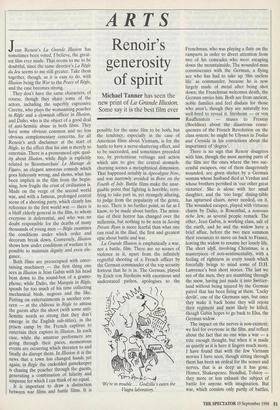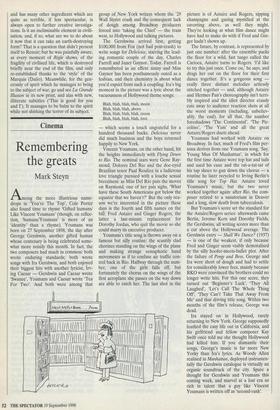ARTS
Renoir's generosity of spirit
Michael Tanner has seen the new print of La Grande Illusion. Some say it is the best film ever Jean Renoir's La Grande Illusion has sometimes been voted, I believe, the great- est film ever made. That seems to me to be doubtful, since the same director's La Regle du Jeu seems to me still greater. Take them together, though, as it is easy to do, with Illusion being the War to the Peace of Regle, and the case becomes strong.
They don't have the same characters, of course, though they share some of the actors, including the superbly expressive Carette, who plays the womanising poacher in Regle and a clownish officer in Illusion, and Dalio, who is the object of a good deal of anti-Semitic abuse in both films. They have some obvious common and no less obvious complementary concerns, for all Renoir's arch disclaimer at the start of Regle, to the effect that his aim is merely to entertain. There is a pronounced epic qual- ity about Illusion, while Regle is explicitly related to Beaumarchais' Le Manage de Figaro, an elegant amorous comedy which goes hideously wrong, and shows, what has been implicit in the film from the begin- ning, how fragile the crust of civilisation is. Made on the verge of the second world war, and with a famous, prolonged central scene of a shooting party, which clearly has reference to the first world war — there is a bluff elderly general in the film, to whom everyone is deferential, and who was no doubt responsible for the deaths of many thousands of young men — Regle examines the conditions under which order and decorum break down. Conversely, Illusion shows how under conditions of warfare it is possible to maintain dignity and even ele- gance.
Both films are preoccupied with enter- taining machinery — the first thing one sees in Illusion is Jean Gabin with his head bent down to the sound-box of a gramo- phone; while Dalio, the Marquis in Regle, spends far too much of his time collecting mechanical birds, negroes and the like. Putting on entertainments is another con- cern — at the château in Regle to amuse the guests after the shoot (with some anti- Semitic words so strong that they don't emerge in the English sub-titles), in the prison camp by the French captives to entertain their captors in Illusion. In each case, while the amateur performers are going through their paces, momentous events are occurring which threaten to and finally do disrupt them. In Illusion it is the news that a town has changed hands yet again; in Regle the cuckolded gamekeeper is chasing the poacher through the guests, generating a combination of hilarity and suspense for which I can think of no equal. It is important to draw a distinction between war films and battle films. It is possible for the same film to be both, but the tendency, especially in the case of American films about Vietnam, is for the battle to have a nerve-shattering effect, and to be succeeded, and sometimes preceded too, by pretentious verbiage and action which aim to give the central stomach- churning scenes a metaphysical dimension. That happened notably in Apocalypse Now, and was narrowly avoided in Born on the Fourth of July. Battle films make the unar- guable point that fighting is horrible, terri- fying to take part in, yet strangely alluring, to judge from the popularity of the genre, to see. There is no further point, so far as I know, to be made about battles. The minu- tiae of their horror has changed over the millennia, but nothing to be seen in Saving Private Ryan is more fearful than what one can read in the Iliad, the first and greatest epic about battle and war.
La Grande Illusion is emphatically a war, not a battle, film. There are no scenes of violence in it, apart from the infinitely regretful shooting of a French officer by the German commander of the top security fortress that he is in. The German, played by Erich von Stroheim with enormous and understated pathos, apologises to the `We're in trouble ... Godzilla's eaten the Viagra laboratory.' Frenchman, who was playing a flute on the ramparts in order to divert attention from two of his comrades who were escaping down the mountainside. The wounded man commiserates with the German, a flying ace who has had to take up 'this useless life' as commander, because he is now largely made of metal after being shot down; the Frenchman welcomes death, the German envies him. Both are from ancient, noble families and feel disdain for those who aren't, though they are naturally too well-bred to reveal it. Stroheim — or von Rauffenstein — muses to Fresnay (Boeldieu) about the disastrous conse- quences of the French Revolution on the class system; he might be Ulysses in Troilus and Cressida in his convictions about the importance of 'degree'.
There is no sign that Renoir disagrees with him, though the most moving parts of the film are the ones where the two suc- cessful escapees, one of them dangerously wounded, are given shelter by a German woman whose husband died at Verdun and whose brothers perished in 'our other great victories'. She is alone with her small daughter, and the `too large' dining-table has upturned chairs, never needed, on it. The wounded escapee, played with virtuoso charm by Dalio, is Rosenthal, a nouveau riche Jew, as several people remark. The other, Jean Gabin, is working class, salt of the earth, and he and the widow have a brief affair, before the two men summon their resources to move on back to France, leaving the widow to resume her lonely life. The short idyll, involving Christmas, is a masterpiece of non-sentimentality, with a feeling of rightness in every touch which forcefully brings to mind some of D.H. Lawrence's best short stories. The last we see of the men, they are stumbling through the snow, having just made it into Switzer- land without being injured by the German patrol that has been firing at them. 'Lucky devils', one of the Germans says, but once they make it back home they will rejoin their regiment and most likely be killed, though Gabin hopes to go back to Elsa, the German widow.
The impact on the nerves is non-existent; we feel for everyone in the film, and reflect about the fact that no one wins a war — a trite enough thought, but when it is made as quietly as it is here it lingers much more. I have found that with the few Vietnam movies I have seen, though sitting through them has been an ordeal for the senses and nerves, that is as deep as it has gone. Homer, Shakespeare, Stendhal, Tolstoy they more or less exhaust the subject of battle for anyone with imagination. But war, which consists only partly of battles, and has many other ingredients which are quite as terrible, if less spectacular, is always open to further creative investiga- tions. Is it an ineliminable element in civili- sation, and, if so, what are we to do about it now that it can take an earth-destroying form? That is a question that didn't present itself to Renoir; but he was painfully aware, as every moment of Regle shows, of the fragility of civilised life, which is destroyed briefly near the end of the film, and only re-established thanks to the 'style' of the Marquis (Dalio). Meanwhile, for the gen- erosity of spirit which he manages to bring to the subject of war, go and see La Grande Illusion in its new print, and alas with new, illiterate subtitles (`This is good for you and I'). It manages to be balm to the spirit while not shirking the terror of its subject.











































































 Previous page
Previous page